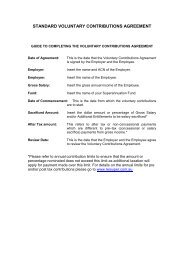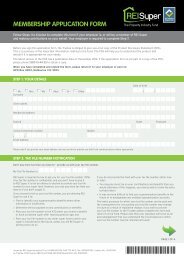Member Information Booklet - REI Super
Member Information Booklet - REI Super
Member Information Booklet - REI Super
You also want an ePaper? Increase the reach of your titles
YUMPU automatically turns print PDFs into web optimized ePapers that Google loves.
investment options<br />
<strong>REI</strong> <strong>Super</strong> Elite offers you a number of different investment<br />
options to cater for your own particular preferences about return<br />
and risk.<br />
History shows that investment markets can behave differently<br />
according to different economic situations, and it is often difficult<br />
to predict these in advance.<br />
You can choose to invest in one option or a mixture, depending<br />
on your investment needs.<br />
There are nine investment options available, each one<br />
representing a different investment strategy and risk. They are:<br />
> <strong>Super</strong> Growth<br />
> Trustee <strong>Super</strong> Balanced<br />
> <strong>Super</strong> Stable<br />
> <strong>Super</strong> Cash<br />
> Australian Shares<br />
> International Shares<br />
> Australian Property<br />
> Global Property<br />
> Fixed Income.<br />
You can make an investment choice when you join the<br />
Fund or when your needs change. See the <strong>Member</strong>ship<br />
Application Form.<br />
If you do not choose an investment option, your account balance<br />
and ongoing contributions will be invested in the Trustee <strong>Super</strong><br />
Balanced option. This is known as the ‘default’ option.<br />
Each investment option presents a different degree of investment<br />
risk (volatility), together with a different likely level of earnings<br />
(return) on the investment. Investment risks include:<br />
> changing economic cycles<br />
> political events, wars and natural disasters<br />
> investment market sentiment<br />
> changes in tax and legislation<br />
> changes in interest rates and currency relativities<br />
> factors affecting particular industries, companies or securities.<br />
The effects of this volatility on investments may be that, over<br />
some period, they do not grow and may, in fact, fall in value.<br />
None of <strong>REI</strong> <strong>Super</strong>’s investment options is capital guaranteed,<br />
and their value may rise and fall.<br />
When making investment decisions, the Fund’s investment<br />
managers take into account the expected return and<br />
performance of their investments depending on their own<br />
investment style.<br />
<strong>REI</strong> <strong>Super</strong> does not currently take into account labour standards<br />
or environmental, social and ethical considerations in selecting<br />
investments of the Fund, nor does it require its investment<br />
managers to do so.<br />
The managers may consider social, ethical, environmental<br />
matters or labour standards of companies within the portfolio<br />
from time to time where these may materially impact on<br />
performance.<br />
page 11<br />
your investment decision<br />
Investment decisions are important and should reflect your<br />
particular circumstances, so in choosing your option(s) it is<br />
important to consider the investment, its level of risk and<br />
expected return, how it relates to your investment goals, and<br />
other investments you may hold. You should read all the<br />
information in this <strong>Booklet</strong> carefully and seek appropriate<br />
professional advice before you make your decision.<br />
Considering your investment goals<br />
To meet your investment goals, an investment must fit with your:<br />
> return expectations – that is, the type of returns that you are<br />
seeking from an investment<br />
> investment time horizon – which is the length of time you<br />
expect to hold an investment, and<br />
> risk tolerance – which refers to the extent of variation in the<br />
value of the investment, and returns from your investment, that<br />
you are willing to bear over the course of your investment.<br />
understanding the risks<br />
All investments have some level of risk. Risk is the likelihood that<br />
you may not get all your money back, and/or get lower returns<br />
than expected.<br />
Investments with higher expected returns often involve higher<br />
risk. Cash investments generally carry the lowest level of risk,<br />
bonds a moderate level of risk, listed property a moderate to<br />
high level of risk, and shares the highest risk.<br />
However, cash investments usually offer the least rewards,<br />
whilst shares have potential for the greatest return.<br />
risk profiles<br />
In the investment profiles shown:<br />
> Trusts with ‘High’ risk profiles may experience periods of<br />
negative (and/or volatile) returns, and loss of value, although<br />
they also offer greater potential returns.<br />
> Trusts with ‘Medium’ or ‘Medium to High’ risk profiles may<br />
also experience periods of negative (and/or volatile) returns,<br />
but not as frequently as Trusts with a ‘High’ risk profile. These<br />
Trusts may also offer greater potential for capital growth than<br />
Trusts with a ‘Low’ risk profile.<br />
> Trusts that have ‘Low to Medium’ or ‘Low’ risk profiles are not<br />
expected to have frequent periods of negative (and/or volatile)<br />
returns, although you may experience negative returns in<br />
certain market conditions; and<br />
> Trusts that have ‘Very Low’ risk profiles are not expected to<br />
have negative (and/or volatile) returns, but may do so in<br />
certain market conditions.<br />
Before investing, it is important that you understand the risk<br />
involved in the investment you are making, your tolerance to<br />
that risk and your proposed investment period.





